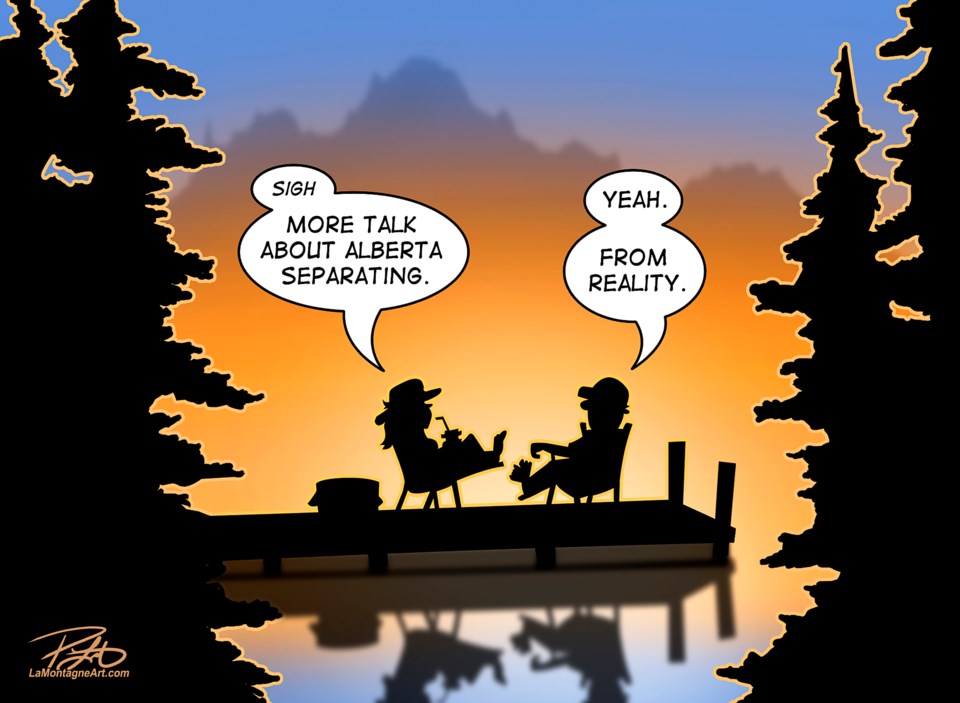The chance of Alberta separating from Canada is next to nil.
The drama, however, will continue to play out for the foreseeable future as it serves as a continued and never-ending battle between the UCP and federal Liberal Party.
A main theme coming out of the federal election was the alienation felt in Wild Rose Country, with some in Alberta long feeling ignored by the Liberal-led federal government the past decade.
Though still held by a minority of people, it’s an important topic that deserves attention as it seemingly has no intent of going away.
Alberta’s relationship with the federal government has never been overly strong, but recent years of Liberal Party governance have seen it kicked back into hyperdrive.
The election of Prime Minister in Mark Carney has continued an already tension-filled relationship. Despite Carney sweeping in from nowhere to capture the leadership of Canada, the Liberal Party still only managed two of Alberta’s 37 seats.
Premier Danielle Smith did little to extinguish such thoughts, all but taking a Jerrycan of gas and dousing a map of Canada when in a public address, said she’d hold a referendum on separation if a petition generated the required support.
Though she said the provincial government wouldn’t push such a vote to separate, and she doesn’t support such a move, it could soon be on a referendum ballot.
The federal government enacted and the Supreme Court of Canada confirmed Clarity Act of 2000 stipulates how such a referendum would take place, which would need a majority of a province’s residents to vote in favour of separation. If successful, it would allow a provincial government to negotiate with the federal government to amend the Constitution of Canada for a possible breakaway from Canada.
This is not the southern United States breaking away from the northern states to launch the American Civil War. If anything, it would become a prolonged negotiation, if it were to happen at all.
Recent polling suggests despite steady talk, the majority of Albertans are more than happy to exist in Canada. In early May, an Angus Reid poll had 64 per cent definitely wanting to stay, leaning to staying or undecided.
A Leger poll earlier this month had similar percentages, with both indicating if an east-to-west pipeline were prioritized, the numbers would swing dramatically more into remaining in Canada.
Since Alberta was made a province in 1905, talk of separatism has been consistent. In the 1930s, the Social Credit Party was elected provincially, which led to divisiveness between it and the William Lyon Mackenzie King-led Liberal federal government.
It continued in the post-Second World War era and was heightened during the Pierre Trudeau federal government, with many seeing a push for bilingualism, multiculturalism and a National Energy Program attacks against Alberta.
A key belief in Alberta separatism is residents are distinct both culturally and economically compared to the rest of Canada. Resource extraction is a key cog in Alberta’s economy, most notably when it comes to oil.
For all its talk, only two referendums on a province separating from Canada have been held, with Quebec choosing to stay in the federal fold in both 1980 and 1995.
Despite the separatism focus by many, the woes facing Alberta are not only those brought by the federal government.
The provincial government should focus on fixing internal matters rather than making the federal government the Boogeyman.
Non-stop healthcare-related scandals show a medical system broken and in need of significant attention rather than a steady move towards privatization, controversial legislation specifically targeting transgender youth is swelling existing anti-trans sentiment, wildlife and environmental policies more suited to a century ago and a continued stripping of municipal authority is leaving many local governments feeling antagonized by the provincial government.
There’s far more important aspects needed to focus on in Alberta and separatism isn’t one.




